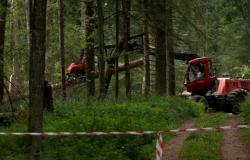The Association of Latvian Doctors (LAB) has appealed to the Environment, Climate and Energy Subcommittee of the National Economy, Agrarian, Environmental and Regional Policy Commission of the Saeima, asking to limit the use of pesticides in agriculture. In the letter, LĀAB points out the proven effects of pesticides on human health in the long term, not only for the current generation, but also for the next generation. The letter was also sent to the Social and Labor Affairs Commission of the Saeima, the Ministry of Health of the Republic of Lithuania, the Ministry of Agriculture of the Republic of Lithuania and the Ministry of Environmental Protection and Regional Development of the Republic of Lithuania.
Yesterday, April 23, the Environment, Climate and Energy subcommittee of the Saeima’s National Economy, Agrarian, Environmental and Regional Policy Commission will consider the issue “On pesticide consumption in Latvia – trends and measures to reduce risk” and on the collective submission of 10,430 Latvian citizens “On the ban on using pesticides in populated countryside” near houses””.
In the letter, the Latvian Association of Physicians points out the latest studies related to the use of pesticides in agriculture and their impact on human health. Pesticides are constantly present in indoor dust, regardless of seasonality, in houses located up to 250 m away from fields treated with pesticides. Thus, residents of houses located at such a distance are exposed to constant exposure to pesticides, which pose significant long-term health risks not only to the current but also to future generations.
Globally, around 380 million acute pesticide poisonings are registered every year, and around 20,000 people die from severe forms of poisoning every year, almost half of whom are agricultural workers.
” It has been proven that even a relatively small dose, but regular intake of pesticides (inhalation, skin contact, ingestion) has adverse effects on human health in the long term, causing damage to the respiratory, endocrine, reproductive, nervous, immune and other systems. Pesticide exposure during pregnancy causes serious health threats to the fetus. The “boom” of oncological, autoimmune, and couples’ infertility is globally linked to the intensive use of pesticides in agriculture and food production. We believe that limiting the use of pesticides is an essential prerequisite for preserving the health of every Latvian resident and ensuring the health of future generations. Ilze Aizsilniece, president of the Latvian Association of Doctors.
The Association of Latvian Doctors calls for a ban on the use of pesticides at least 25 meters away from people’s residences. Farmers who plan to use pesticides, herbicides, insecticides and fungicides must inform the residents living near such agricultural lands in writing, as well as using the official information websites of the relevant municipality, at least one week before the planned use of the product. The information to be notified must include information about the day, time and which plant protection product is planned to be used. The use of pesticides in populated areas such as towns and villages is not allowed.
The Association of Latvian Doctors believes that a situation in which entrepreneurs involved in agriculture can use subsidies to purchase pesticides should not be allowed. In essence, the tax money of Latvian citizens is used to worsen their health. It is no less important to inform and educate Latvian citizens about the impact of pesticides on the environment and their health.
Tags: Doctors raising alarm calling pesticide growing health concerns
-





